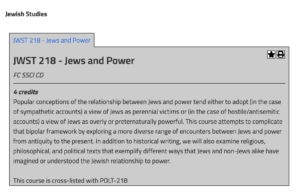A description of a course beginning this week at Oberlin College, my alma mater, reads: “Popular conceptions of the relationship between Jews and power tend either to adopt (in the case of sympathetic accounts) a view of Jews as perennial victims or (in the case of hostile/antisemitic accounts) a view of Jews as overly or preternaturally powerful. This course attempts to complicate that bipolar framework by exploring a more diverse range of encounters between Jews and power from antiquity to the present.”
There’s nothing wrong, of course, with a take-down of the view of Jews as “overly or preternaturally powerful,” a trope popularized by the antisemitic forgery the Protocols of the Elders of Zion. The problem is with the other half of the course, the one that purports to “complicate” the “sympathetic account” of Jews “as perennial victims.”

It’s sadly become a generally accepted fact that antisemitism in the US has been making troubling inroads on both the left and the right of the political spectrum. On the right, antisemites are, at least, open and honest, unabashed or even, at times, proud. This type of antisemitism is easy to spot and to diagnose.
The antisemitism of the left is more clever. It hides in plain sight, disguising itself frequently as pro-Palestinian or human rights activism. Other times, left-wing antisemitism poses virtuously as opposition to the antisemites of the right. For example, the film “Israelism” complains, “American Jewish organizations have spent the last decade pouring millions of dollars into smearing and marginalizing human rights advocates… trying to brand Palestinian protest as antisemitic when there were neo-Nazis trying to kill us in our synagogues!” according to a review from StandWithUs. (Notably, the film was screened at Oberlin in November of 2023, just a month and a half after the October 7 attack in which 1200 Israelis were killed by Hamas.)
This attempt to promote one brand of antisemitism, even while using a critique of a different form of antisemitism as a shield, is what we see in Professor Matthew Berkman’s course.
The assertion that Jews, or those who “sympathize” with Jews, claim perennial victimhood in order to further malevolent ends forms the basis of a great deal of antisemitism; the “victimhood” canard is a straw man set up to demonize Jews. (For one example, see here.) Yet that is the very same assertion that is being made in the course description itself.
The Oberlin administration claims the course is designed to oppose antisemitism. That is partially correct, but it also serves to operate as a smokescreen. To understand this requires an acknowledgement that antisemitism can take different forms, and that antisemites of different stripes can at times come together (as when David Duke called Ilhan Omar “the most important Member of the US Congress”) and can at other times operate in opposition to each other, depending on what best suits their needs. The pretense of opposing antisemitism, but only opposing antisemitism from the right, can serve to bolster the credentials of those who themselves promulgate a different flavor of antisemitism.
In light of the course description’s obvious opposition to right-wing antisemitism, some may be tempted to give the course the benefit of the doubt. But a quick look at the history of the instructor, someone who, according to Canary Mission, has himself been a long-time member of a left-wing antisemitic group, should quickly put any such doubt to rest. Even as the course, according to its description, knocks down one antisemitic trope – that of Jews possessing supernatural powers – it promotes a different one: that Jews fallaciously claim victimhood for political gain.
Since the time when Oberlin made news because of a professor who, among other things, blamed Israel for the September 11 attack on the US, the new Oberlin administration, led by President Carmen Twillie Ambar, seemed to have made strides in combatting antisemitism. With a few of worst actors having departed the campus under various circumstances, President Ambar issued a decent statement regarding the October 7 attack on Israel and recently blocked a terror-supporting speaker that a student group had attempted to bring to the campus. In the Spring of 2024 when antisemitic campus protests rocked the country, the protests at Oberlin were, in comparison, mild, and Oberlin stayed out of the news. But now, the Oberlin administration’s vision seems once again to be occluded when it comes to left-wing antisemitism, and Professor Berkman’s course threatens to bring the school back to the Karega era.

